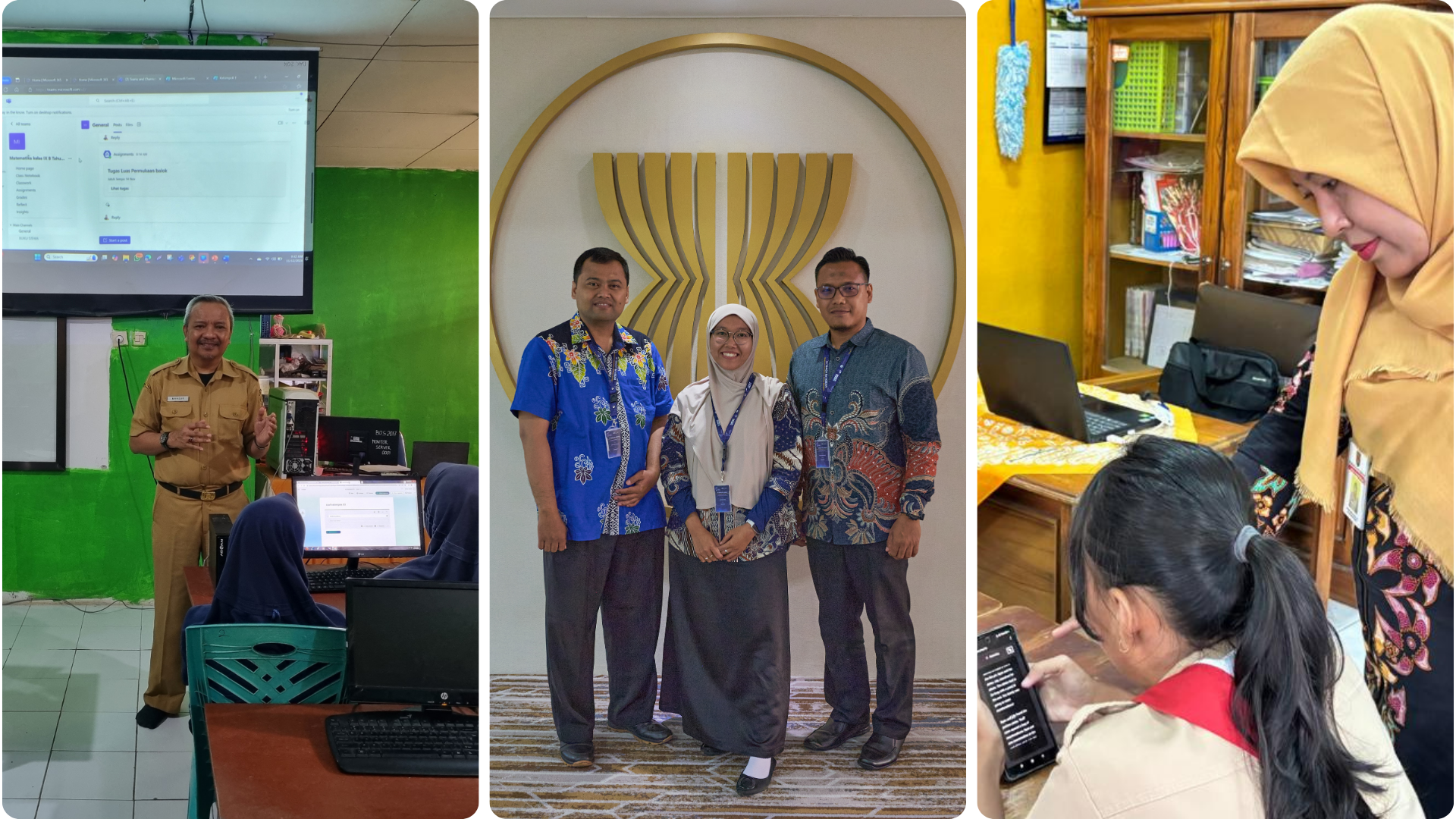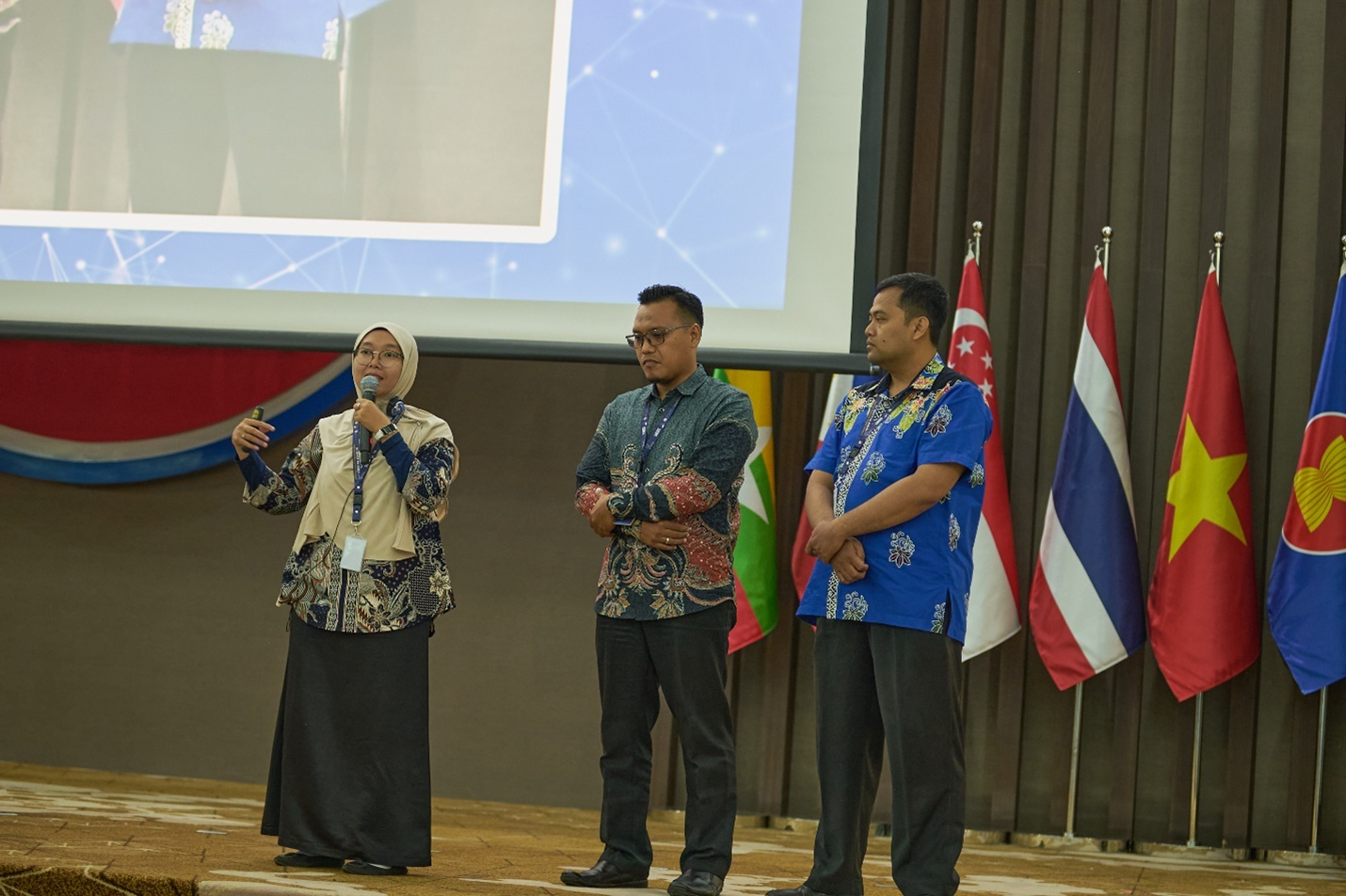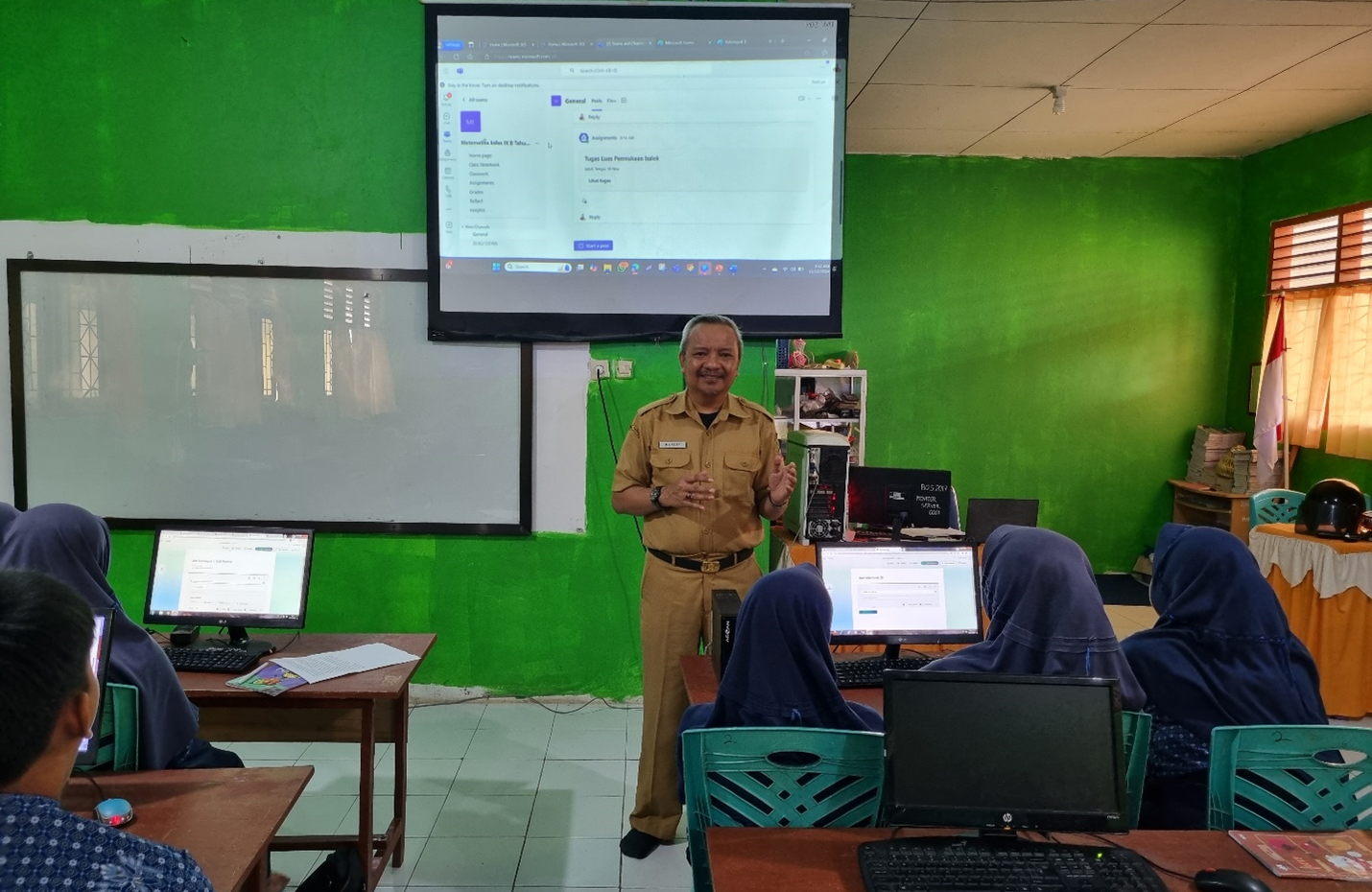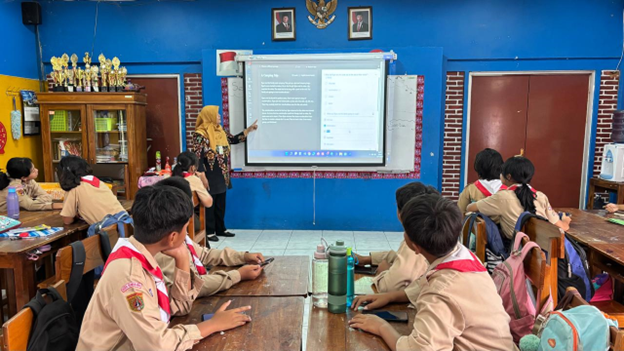Doc. Marheni Widya Retna, Plan International Indonesia Foundation/Temmy Subrata, Mansur
The rapid adoption and innovation of AI in today’s transformative era have significantly impacted various facets of life, including education. According to the LinkedIn Future of Work Report 2023, while more than half of an educator’s role involves human-centric skills like classroom management and teaching—best delivered through direct interaction—AI can play a pivotal role in enhancing productivity for tasks such as lesson planning and curriculum development, which account for 45% of teachers’ responsibilities. By assisting in these areas, AI frees up educators to focus on what only they can do—connecting with students in meaningful, real-time ways to make a lasting, positive impact on their learning journey.
“AI holds immense potential in education. From personalizing learning materials and processes to assisting with lesson planning, simplifying administrative tasks, and delivering data-driven insights on student performance and enrollment trends, AI can be a game-changer. To fully harness these benefits, we must address challenges such as accuracy, efficacy, and over-reliance on AI, while also providing adequate support for educators. At Microsoft, our goal is to empower teachers as the experts in control, integrating AI into their workflows to genuinely alleviate their workload,” said Arief Suseno, Education Lead Microsoft Indonesia.
In Indonesia, teachers from various regions have been embracing AI technology with enthusiasm and resilience. These educators are stepping outside their comfort zones, learning, and innovating with AI to create more engaging learning experiences while preparing students for a workforce that increasingly demands AI-related skills. In celebration of National Teacher’s Day 2024, here are three inspirational stories of Indonesian educators who have harnessed AI in the classroom, demonstrating innovation and dedication.
From Trainees to Champions – The Inspiring Journey of the AI MISS YOU Team from Probolinggo
Doc. Plan International Indonesia Foundation/Temmy Subrata. (from left to right) Suci, Fafan, and Sigit presenting their MISS YOU AI innovations at the AI TEACH regional hackathon.
Three visionary teachers—Fafan Adisumboro, Suci Romadani, and Sigit Hadi W.—from Probolinggo, East Java, have taken innovative steps to teach critical thinking skills to their students through the application of AI. Their project, “AI MISS YOU” (Artificial Intelligence to Improve Original and Unique Student Critical Reasoning), encourages students not only to consume information but also to create, innovate, and solve problems.
This initiative is built upon the TEBALKAN method—Temukan (Discover), Bayangkan (Imagine), Lakukan (Do), and Bagikan (Share)—which invites students to use AI tools like Microsoft Copilot and Designer to explore specific learning topics, imagine creative ideas, implement those ideas practically, and share their outcomes.
“We drew inspiration from Ki Hadjar Dewantara’s philosophy, which emphasizes that children are not ‘blank slates’ merely absorbing information but are creative individuals who need empowerment. Through this philosophy, the TEBALKAN method encourages students to be active and critical participants,” Sigit explained.
Over the past few months, the team has implemented the TEBALKAN method as part of the Pancasila Student Profile Strengthening Project (P5), a multidisciplinary initiative aimed at developing students’ innovative and adaptive character. For example, students were challenged to process mango leaves, a local agricultural product in Probolinggo, into herbal tea. Using AI, students explored recipes and techniques to produce the best-tasting mango leaf tea.
“We chose mango leaves because they are a staple crop in Probolinggo. By utilizing AI, students could compare the results of different experiments to determine the optimal way to create high-quality mango leaf tea with the best taste. Our role as teachers was to guide their innovation process and strengthen their understanding,” said Suci.
This project not only honed students’ critical thinking and technical skills but also uncovered new economic opportunities with market potential. Fafan, Suci, and Sigit began as participants in the AI TEACH training program, conducted by Plan Indonesia and supported by Microsoft. Their determination and creativity eventually led them to win the Southeast Asia AI TEACH hackathon. Beyond facilitating technology, they act as mentors, providing direction and moral support to ensure that AI enhances their role as educators without replacing it.
Making Mathematics Fun and Easy to Understand with AI: Mansur’s Story from South Sulawesi
For Mansur, a mathematics teacher at SMP Negeri 2 Pangsid in Sidenreng Rappang, South Sulawesi, AI offers a way to make math lessons more accessible and enjoyable for his students. By integrating Microsoft Copilot into his teaching, Mansur provides students with step-by-step assistance to solve math problems, focusing not just on the final answer but on the reasoning and processes involved. According to Mansur, the most important thing is not only the student’s final answer, but whether the student can explain how they got the answer. This is where AI comes into play: it helps students practice their reasoning and understanding of the stages of solving math problems without feeling inferior if they need to ask questions repeatedly or have different comprehension speeds.
“We invite students to use AI as a means of solving math problems in a fun way. Of course, we also ask them to explain the flow of mathematical formulas they get from AI, to form understanding and reasoning that can be accounted for,” said Mansur.
Mansur’s innovative approach motivates students to see math as an opportunity to develop logical and analytical thinking skills rather than merely memorizing formulas. He encourages fellow teachers to embrace AI technology, offering students new ways to engage with mathematics.
Doc. Mansur
Since 2016, Mansur has been an active member of Microsoft Innovative Educator Experts (MIEE), a global community of educators who use Microsoft technologies innovatively to enhance learning experiences and collaboration in the classroom. Mansur also recorded achievements in establishing the Microsoft Innovative Teacher Community on the Merdeka Teaching platform and became a representative of teachers from Indonesia at the Education Exchange in Singapore in 2018.
Mansur added, “It has been over a year since we established the Microsoft Innovative Teacher Community on the Merdeka Teaching platform. So far, there are 4,000 members, and every week, actively holds webinars to discuss the topic of AI in education and other different topics in order to add insight and skills to educators.”
Boosting Literacy and English Skills with AI: Marheni Widya Retna’s Initiative in Semarang
In Semarang, Central Java, Marheni Widya Retna, a 6th grade teacher at SD Negeri Sendangmulyo 04, became one of the few elementary school teachers who had the opportunity to take part in AI training held by Microsoft Indonesia, the Central Java Technology and Communication Development Center (BPTIK), and the Indonesian Ministry of Education and Culture in the first phase.
As a 6th-grade elementary school teacher, Marheni uses the Reading Progress feature on Microsoft Teams to increase students’ interest in literacy and reading skills in English texts. Reading Progress in Microsoft Teams is supported by AI technology to help teachers assess the progress of students’ reading skills more accurately. AI analyzes the results of video or audio recordings when students read a text and then provides data about students’ reading performance, helping to improve reading skills efficiently.
Doc. Marheni Widya Retna
It is known that the feature also has a reading comprehension function that can automatically create questions along with answer keys based on the variety of selected text. This makes it easier for teachers to compile learning materials that are tailored to the needs of students according to the grade level. Marheni understands that to increase students’ interest in reading from an early age, teachers need to provide a reading that is not only interesting but also varied and in accordance with the student’s ability level.
“By using Reading Progress, I can get more varied English texts to introduce to children, so that they get a new and interesting reading, and not boring. That’s thanks to what I got during the Microsoft Teams training,” explained Marheni.
Through this initiative, Marheni hopes that students will be more motivated to improve their literacy, culture, and English language skills. This will help students prepare for the next level of education and open their horizons to a wider range of English literature.
“In addition to helping students, the Reading Progress feature also provides more transparency for parents in assessing their child’s academic progress. Parents are happy to see the learning results I share through Microsoft Teams, and many of them are starting to be interested in this technology,” concluded Marheni.
Integrating AI into the World of Education, a Step Towards a Golden Indonesia 2045
Indonesia needs an educational transformation that relies on technology as a driver of change to improve the quality of human resources. As we enter a new era of AI, it is time to prepare a generation that is competitive and capable of using AI. Microsoft has presented the AI Skills Navigator website, an AI-powered learning platform that can help every individual, including teachers, find their own goals, levels, and learning styles. This platform is expected to help every individual thrive in the AI era.
-END-




